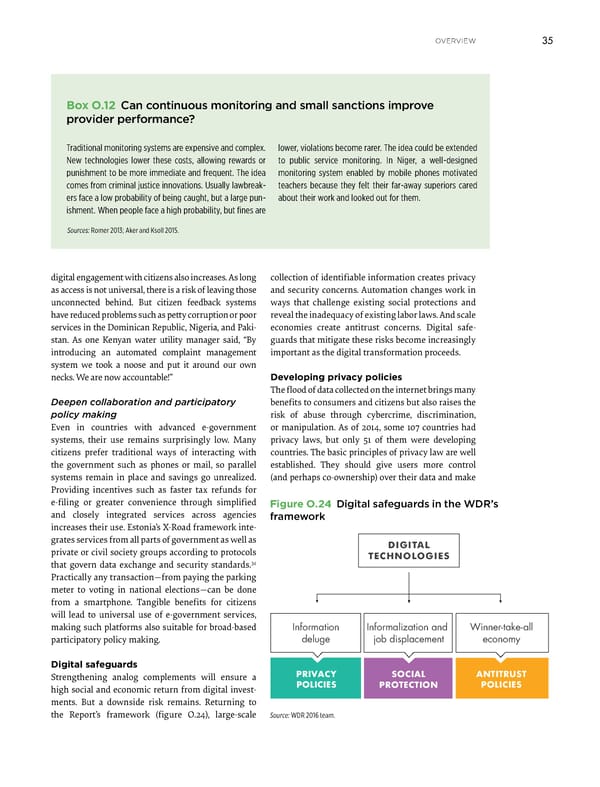overview 35 Box O.12 Can continuous monitoring and small sanctions improve provider performance? Traditional monitoring systems are expensive and complex. lower, violations become rarer. The idea could be extended New technologies lower these costs, allowing rewards or to public service monitoring. In Niger, a well-designed punishment to be more immediate and frequent. The idea monitoring system enabled by mobile phones motivated comes from criminal justice innovations. Usually lawbreak- teachers because they felt their far-away superiors cared ers face a low probability of being caught, but a large pun- about their work and looked out for them. ishment. When people face a high probability, but fines are Sources: Romer 2013; Aker and Ksoll 2015. digital engagement with citizens also increases. As long collection of identifiable information creates privacy as access is not universal, there is a risk of leaving those and security concerns. Automation changes work in unconnected behind. But citizen feedback systems ways that challenge existing social protections and have reduced problems such as petty corruption or poor reveal the inadequacy of existing labor laws. And scale services in the Dominican Republic, Nigeria, and Paki- economies create antitrust concerns. Digital safe- stan. As one Kenyan water utility manager said, “By guards that mitigate these risks become increasingly introducing an automated complaint management important as the digital transformation proceeds. system we took a noose and put it around our own necks. We are now accountable!” Developing privacy policies The flood of data collected on the internet brings many Deepen collaboration and participatory benefits to consumers and citizens but also raises the policy making risk of abuse through cybercrime, discrimination, Even in countries with advanced e-government or manipulation. As of 2014, some 107 countries had systems, their use remains surprisingly low. Many privacy laws, but only 51 of them were developing citizens prefer traditional ways of interacting with countries. The basic principles of privacy law are well the government such as phones or mail, so parallel established. They should give users more control systems remain in place and savings go unrealized. (and perhaps co-ownership) over their data and make Providing incentives such as faster tax refunds for e-filing or greater convenience through simplified Figure O.24 Digital safeguards in the WDR’s and closely integrated services across agencies framework increases their use. Estonia’s X-Road framework inte- grates services from all parts of government as well as DIGITAL private or civil society groups according to protocols TECHNOLOGIES that govern data exchange and security standards.34 Practically any transaction—from paying the parking meter to voting in national elections—can be done from a smartphone. Tangible benefits for citizens will lead to universal use of e-government services, making such platforms also suitable for broad-based Information Informalization and Winner-take-all participatory policy making. deluge job displacement economy Digital safeguards Strengthening analog complements will ensure a PRIVACY SOCIAL ANTITRUST high social and economic return from digital invest- POLICIES PROTECTION POLICIES ments. But a downside risk remains. Returning to the Report’s framework (figure O.24), large-scale Source: WDR 2016 team.
 World Development Report 2016 Page 50 Page 52
World Development Report 2016 Page 50 Page 52